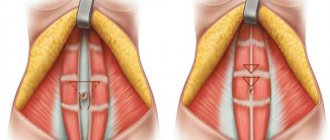For patients aged 10 to 17 years, all medical services are provided free of charge.
Make an appointment for a consultation by phone.
One of the problems that significantly complicates the work of a pediatric gynecologist is late access to a doctor in case of menstrual irregularities, delays or abnormal menstruation in teenage girls.
Until now, any topics related to sexuality are considered extremely intimate in our society, closed for discussion. Because of this, many girls are embarrassed to talk about their problems with their parents and even with their gynecologist. The lack of reliable information about the characteristics of menstrual discharge causes some of them to show excessive anxiety and even fear upon the onset of menarche. Others, on the contrary, due to the inability to assess how normal the changes occurring in the body are, do not pay attention to negative symptoms or hope that everything will improve on its own.
Modern gynecologists consider menstrual discharge to be one of the main indicators of a woman’s health status. Many diseases and pathological conditions lead to delays, disruption of cyclicity and the occurrence of other abnormalities. Early detection of the problem allows you to start treatment in a timely manner and subsequently apply preventive measures to curb the development of the disease.
Most girls experience their first menstruation between 12 and 14 years of age. However, in reality, the process of puberty begins several years earlier. From about 8 years old, the level of specific sex hormones in a girl’s body begins to increase, under the influence of which her body gradually begins to change.
The transformation affects almost all organs and systems: the pelvic bones expand, the thickness of the fat layer increases, due to which the body of a teenage girl acquires feminine roundness, and the development of secondary sexual characteristics begins.
Changes occur in a certain sequence. At about 9-10 years old, the mammary glands begin to enlarge, the process of formation of their internal structure begins, which lasts about 6-7 years and ends at about 15-16 years of age. During the same period, the girl begins to develop hairs on her pubic area, and then on other parts of her body. Only after two or three years does the first menstruation occur, giving rise to menstrual cycles.
The cyclical nature of menstruation is due to certain physical changes and hormonal fluctuations that prepare the female body for pregnancy and bearing a child. If pregnancy does not occur during one period, a kind of renewal and return to the original state occurs in the body, i.e. menstruation, giving rise to a new cycle.
Features of menstruation in teenage girls
Pediatric gynecologists consider the following indicators to be the conditional norm:
- age of menarche, i.e. the onset of the first menstruation - about 12-13 years;
- the duration of the monthly cycle during the first year is from 21 to 35 days;
- duration of menstruation – from 3 to 7 days;
- The permissible interval between menstruation is from 21 to 45 days.
During the first year, the cyclicity of the onset of menstruation is just being established, so small delays, fluctuations in their duration and frequency are not a dangerous deviation. Parents should remember that their regularity and intensity can be influenced by various external factors.
Due to the lack of clear indicators of the norm, parents do not always understand in what cases it is necessary to contact a pediatric gynecologist.
Main signs to see a doctor:
- no breast enlargement by age 13;
- absence of menstruation before age 15;
- cessation of monthly discharge for more than 90 days;
- irregular menstruation;
- the duration of the monthly cycle is less than 21 days or more than 40 days;
- duration of menstruation over 7 days;
- excessive bleeding, requiring changing tampons or pads every 2 hours or more often;
- severe pain accompanying menstruation;
- spotting between periods.
If a girl has at least one of the listed signs, she must be shown to a doctor.
Why do delays occur and the cyclicity of menstruation in girls occurs?
If the menstrual cycle is unstable, the following factors may influence its fluctuations:
- poor ecology, presence of pollution in the environment;
- constant quarrels between family members, unfavorable psychological situation in the house;
- heredity, late onset of menstruation and irregular periods in the mother;
- long-term stress and anxiety associated with studies, or conflict situations that arise when communicating with peers;
- excessive physical activity due to intense sports or a large amount of housework (more often happens in families living in rural areas);
- unbalanced diet, lack of nutrients, vitamins and minerals;
- metabolic disorders, obesity.
In any of these cases, delays and disruption of the menstrual cycle are possible. When they appear, it is necessary to visit a pediatric gynecologist as soon as possible to establish the cause of the pathology and begin its treatment.
Contact our medical center to consult a qualified gynecologist specializing in the treatment of children and adolescents. We can do any tests that are necessary to diagnose the disease, undergo ultrasound and other types of research.
Return to normal KBJU
Everyone wants quick results, but it usually takes months and years to gain excess weight. Therefore, you should systematically get rid of extra pounds so that the problem of lack of menstruation does not arise. You don’t need to choose exotic diets; it’s better to calculate your daily caloric intake and protein, carbohydrates, fats on your own or using an online calculator.
You need to be prepared for the fact that at first after strict restrictions, the body will store food chaotically, even if the nutritional value of food per day does not exceed 1200 kcal. This is normal, as soon as he understands that you eat like this every day, without cutting your diet to the extreme 400 calories, the internal mechanisms will return to normal. You will begin a smooth and, most importantly, healthy weight loss. The cycle will be restored within 1.5-2.5 months.
The negative impact of stress on the monthly cycles of teenage girls
In adolescence, a girl’s nervous system, as a rule, is not highly stable and is subject to high stress. The hormonal changes occurring in the body contribute to the emergence of strong emotional fluctuations. A stressful state can be caused by even insignificant or ordinary, from the point of view of an adult, events, which does not eliminate the need to combat this phenomenon.
Most often, the following manifestations act as stress factors.
- Changes in body shape or function. This is most typical for girls who started puberty earlier than their peers. They often experience psychological discomfort due to the changes taking place and are embarrassed about their body. Another common reason for stress is a change in metabolism, leading to a sharp increase in body fat.
- Conflicts with peers. It is no secret that violence in various forms is widespread among teenagers today, from moral pressure to physical influence.
- Family problems. Any deterioration in the psychological atmosphere in the family has a sharply negative impact on the fragile nervous system of adolescents. Excessive severity, lack of trust between parents and the girl, indifference to her problems, quarrels between mother and father - all these are stress factors for the child.
- Moving. Changing a place of residence in adolescence is much more difficult to endure than in adulthood, since a girl’s social circle completely changes, she is forced to join a new team, and this does not always happen without conflicts.
- Love experiences. During adolescence, almost all girls experience the feeling of falling in love for the first time. It may be unrequited or cause reciprocal feelings on the part of the object of love, but in any case it serves as a source of extremely acute and violent emotions.
- Studies. The increased attention today aimed at achieving high results in the Unified State Exam and other educational tests often serves as a source of stress for schoolgirls.
Parents should avoid circumstances that contribute to the formation of stressful situations. The child’s psyche is extremely vulnerable, and the consequences of mental trauma often manifest themselves through a variety of physical ailments, including in the form of disorders of the development of reproductive function.
The fact is that a stressful state is accompanied by an increase in the production of prolactin, a hormone that is usually produced in large quantities during pregnancy and lactation.
One of the most important functions of prolactin in a woman’s body is to control the production of progesterone, a hormone that regulates the course of the menstrual cycle in its second, final phase. In addition, prolactin has a regulatory effect on thyroid cells. The higher the level of prolactin in the body, the more the secretion of hormones in the thyroid gland is inhibited. At the same time, prolactin impairs the passage of signals between the thyroid gland and the pituitary gland, resulting in an increase in the production of thyroid-stimulating hormone. High TSH levels contribute to the development of menstrual irregularities, usually leading to delays. If prolactin levels are maintained at a consistently high level for a long time, the result is a complete cessation of menstruation, or amenorrhea.
Another negative manifestation of stress is an increase in the activity of another hormone-producing organ - the adrenal cortex. There is an increase in the production of cortisol, a hormone that also affects the menstrual cycle and overall metabolism. The consequence of excessive cortisol production is often an increase in body fat, deterioration of the skin, as well as hirsutism - increased growth of body hair. Menstruation becomes irregular and leads to delays. If the condition does not improve over a long period of time, infertility may result.
Solving the problem of delayed menstruation
Non-drug methods
Minor irregularities in the menstrual cycle, with preservation of ovulation, which are functional in nature, can go away on their own if favorable conditions are created for this. Normalizing sleep and wakefulness patterns, combating stress, proper nutrition, and giving up bad habits can help bring women's health back to normal without the use of medications.
Drug treatment
The tactics of drug treatment for frequent delays in menstruation depends on the purpose of therapy and the severity of the disorders. Most often, combined oral contraceptives are prescribed, which help normalize the menstrual cycle, making it more regular and constant. It is also recommended to prescribe progestogens, which reduce endometrial hyperplasia and the risk of cancer of the uterine mucosa.
If ovulation is disrupted and the patient desires to become pregnant, ovulation stimulation and comprehensive infertility treatment are performed.
How to deal with stress in teenagers
Since the impact of stress on the development of the reproductive system of girls is extremely great, reasonable and responsible parents should do everything in their power to minimize the risk of their occurrence.
- Try to get psychologically closer to your daughter and create a trusting, friendly atmosphere in the family. She should know that when dealing with her problems, she will receive not reproaches and lectures, but sympathy, friendly advice and help.
- Support your child's hobbies, provide opportunities to attend extracurricular sports, arts, crafts, etc. Children and teenagers who have hobbies are much less likely than their peers without hobbies to experience stress and find themselves in dangerous company.
- Organize a girl’s daily routine, in which there is room not only for studying and computer games or social networks, but also for other activities. Make sure she goes to bed on time and sleeps for at least 8-9 hours.
- Physical activity is the key to a girl’s harmonious development. Walking and cycling, classes in a dance club or sports section not only strengthen the body, but also normalize the functioning of the nervous system, neutralize the effects of stress factors, and help to calm down.
- Be an example for your child of a calm and balanced approach to everyday problems. Teach your daughter to look at any situation from a positive point of view, instill in her the confidence that any obstacles can be overcome to her advantage by finding positive aspects in them.
- Be sure to encourage every child’s success, even small ones, praise your daughter more often and tell her how much you love her. For a girl, emotional contact with her parents is especially important.
How to lose weight without breaking your cycle
With proper weight loss, problems with missing periods do not happen. Before starting a diet, it is better to visit a gynecologist-endocrinologist to find out the general condition of the body and how stable the hormonal levels are. If you lose weight under the supervision of a specialist, then the likelihood of cycle disruption is minimal.
Here are some tips that doctors give for healthy weight loss:
- Calculate your allowance for carbohydrates, proteins and fats and do not reduce their amounts.
- If you want to continue losing weight, then subtract 200-350 calories from your daily calorie intake. Yes, you won’t be able to lose weight quickly, but you won’t lose your period.
- Include only healthy proteins, complex carbohydrates and fats in your diet. These are any types of fish, poultry, lean meat, cereals, fruits and vegetables.
- Move and engage in different types of physical activity every day. But training in general should not be long and exhausting.
- During critical days, it is advisable to increase caloric intake by 100-150 calories so that the body can easily replenish the lack of energy. On these days, it is advisable to take an additional vitamin tablet.
- It is important to avoid stress and get enough sleep.
- During the diet, you should periodically take multivitamin complexes. Most often, there is a lack of vitamins B, A, E, D, as well as iron, calcium and zinc.
A balanced diet and careful attention to your health - these postulates should become the rule if you want to lose weight. After all, when we decide to lose weight, we want to become healthier and more beautiful, and not to acquire even more problems and diseases.
What to do in case of delays and irregularities in the monthly cycle
The first step after contacting a pediatric gynecologist, as a rule, is a thorough examination of the young patient. It includes:
- gynecological examination;
- determination of body mass index;
- ultrasound examination of the peritoneal organs;
- clinical urine and blood tests, as well as, if necessary, biochemical blood tests;
- analysis of hormone levels.
The listed measures allow us to determine the cause of deregulation of the menstrual cycle. If the problem arose due to deterioration of the thyroid gland, the doctor prescribes hormonal therapy. During treatment, monthly monitoring of hormone levels is carried out. Violations caused by a lack of vitamins can be eliminated with the help of a balanced diet and multivitamins, in particular E and group B.









